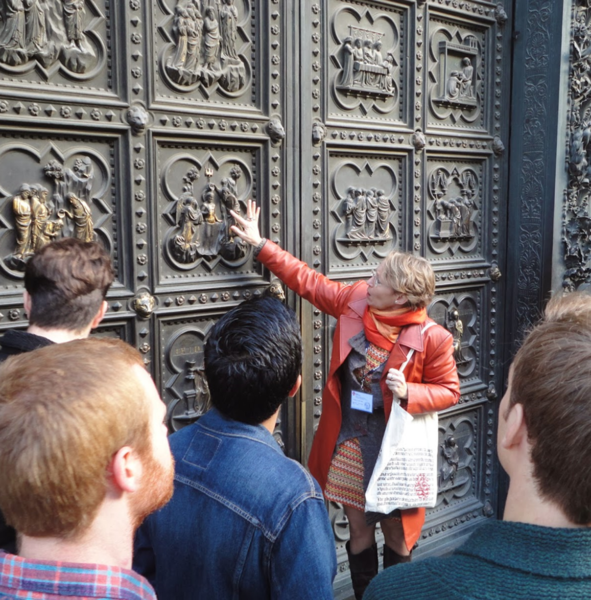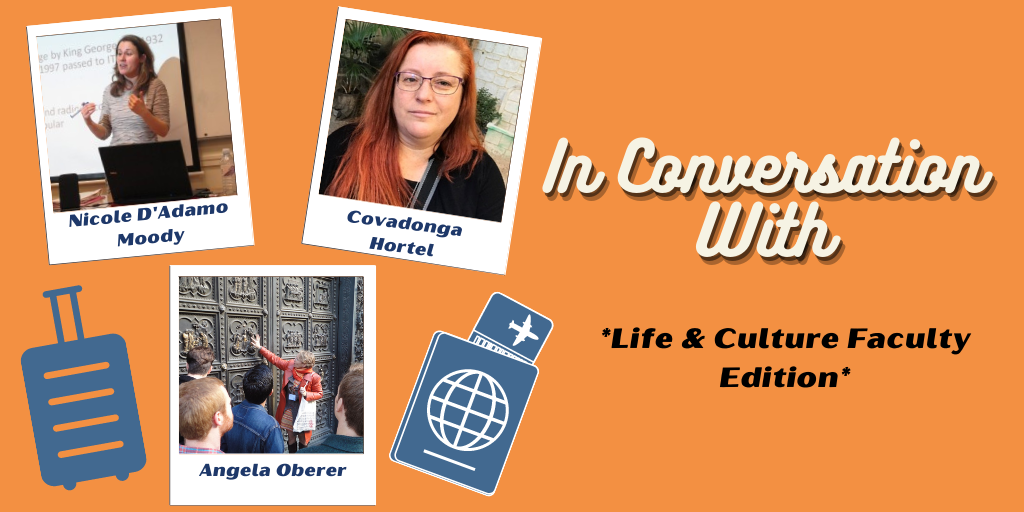This week, we are highlighting the amazing work of our Life & Culture faculty members from across the globe. Nicole D’Adamo Moody, Covadonga Hortal, and Angela Oberer are all important members of our staff when it comes to Customized Faculty-Led Programming.

Nicole D’Adamo Moody, BA Hons, MA, HEA
Location: London, England
Quick Bio:
Nicole D’Adamo Moody originally worked in the study abroad sector, organizing student programs around western and central Europe, particularly in Italy, where she spent much of her childhood and where she completed an Erasmus program at Bologna University (Cultural Studies) as part of her BA Honors degree in Politics from Leeds University. She has taken particular interest and enjoyment from working with American students and, in 2003, completed an MA in United States Studies from the Institute of the Americas in London. Nicole was also awarded a Distinction in her Professional Certificate for Teaching and Learning at Higher Education from the Institute of Education in London and is a Fellow of the Higher Education Academy. She started teaching British Life and Cultures (BLC) to American University students in 2008, lecturing on an array of topics including The US/UK “Special Relationship”, Comparative Education Systems in the US and the UK and British Politics. Along with BLC, she teaches The History of London and London Global City courses and supports academic assessment of AIFS’s Internship program. Nicole enjoys leading student groups on field trips and exploring some of the hidden stories within London’s rich and diverse culture.
What led you to teaching culture classes to students from the U.S.?
I have always been drawn to two fields: education and travel. I began working for AIFS organizing study abroad programs, which, amongst other things, gave me the opportunity to work and visit a wonderful array of locations from Florence to Rome, Prague to Athens. However, I also knew that eventually I wanted to teach, so I pursued my post-grad studies while working. And I also knew I wanted to teach American students! I’d already experienced a rich cultural discourse in my interaction with students and professors from the US and found these cross-cultural ideas engaging and inspiring. Having lived in Rome in Italy for part of my childhood it felt natural to want to explore differences between cultures and I was particularly fascinated by the historic, cultural and political links between the United States and the United Kingdom.
Did you have a study abroad experience? (Have you been to the U.S.?)
I was a participant of the Erasmus study abroad program and lucky enough to spend a year at Bologna University in Italy. It was one of the best years of my life and I was able to experience a completely different style of teaching in the field of Cultural Anthropology and Asian Philosophy, culminating in a wonderful month backpacking around India. I would unreservedly recommend study abroad – it felt like it helped me to grow up about ten years and learned a lot about myself! I have also been lucky enough to visit the US widely and visit a number of campuses and Universities. The richness of different educational settings from community colleges, to large public universities to smaller private college, is always interesting.
Is there a favorite topic to teach, or a topic that draws the biggest reaction?
Every student group is different and it’s always interesting to see what topics draw the greatest reaction from different groups. Recently I think the history of the British Empire and its legacy on our social fabric today has been a very important topic. Comparing the different education systems while students are learning in London is always relevant and the study of our health care system (the NHS) with comparison to the US system tends to draws a big reaction and plenty of discussion. I also think the BLC field trips (whether it is to a diverse neighborhood in London, Shakespeare’s Globe Theatre or the Houses of Parliament) are invaluable in terms of learning and make a great impact on students.
Do you learn from your students too? Does anything specific come to mind?
I learn so much from my students all the time! It’s actually the greatest joy in teaching to hear different and new perspectives on a topic. And engaging with the students as much as possible always reminds me that although we might speak the same language (more or less!) we experience very different cultural systems underpinned by different value systems. I do think the role of an instructor is to respond, to question, and to help unpack the experiences that students bring to the classroom and that, in my opinion, provides a great backdrop for learning to take place – mine as well as the students!

Covadonga Hortal
Location: Seville, Spain
Quick Bio:
Covadonga is passionate about travel and education and, after graduating from University with a Degree in Tourism, she decided to specialize in both fields. She led her first travel program in 1999 and continues to enjoy leading groups, having worked as a cultural guide around Europe. Covadonga has an ample competency in Spanish culture, having recently obtained my European Joint Qualification as an Expert in Cultural Tourism, and have given many lectures to US College students and Road Scholar participants. She is a certified English and Spanish teacher, speaks some French, Chinese, Russian and Catalan, and loves traveling for leisure in her free time.
What led you to teaching culture classes to students from the U.S.?
Culture classes combine my two passions; travel and education. Being able to introduce my country to foreign students is a privilege, and there’s nothing I enjoy more than seeing their faces when I know I’m saying something shocking and different from what they were expecting. Telling them about Spanish art, music or traditions is a huge responsibility, and I try to address it as wholeheartedly and objectively as possible.
Did you have a study abroad experience? (Have you been to the U.S.?)
I did! Before college, I lived in the UK for a summer (first) and a semester (next), while trying to learn some English, which I didn’t speak back then. I met tons of people from all over the world, some of whom are still close friends of mine, and had an experience everybody should go through. Studying abroad is ineluctable if you wish to become a whole, open and unprejudiced person. I have been to the States six times, and completely love the country. I know pretty well New York State, as well as some of the main cities on the East Coast. I have also been to the West Coast twice, but never made it further than San Francisco to the north. As you can imagine, there are still so many things I’d like to visit there!
Is there a favorite topic to teach, or a topic that draws the biggest reaction?
All topics are special, they all have something alluring. No matter if we’re talking about architecture or politics, festivals or literature, there’s always some interest in them, and I can definitely tell from the questions I get afterwards. However, if I had to choose, I would go for the very first one, the ‘Intro to Spain’. Although that is an intercultural introduction rather than a topic in itself, it covers so many things they are going to be dealing with on a regular basis that I love explaining to them what to expect, making sure they have all the information I can possibly provide them with so they’re ready for their stay.
Probably the topic drawing the biggest reaction is Bullfighting. There are no neutrals there, students usually go for or against it with all their might, which at times leads to some very great discussions. The recent history of Spain can sometimes draw some ‘heated’ reactions too.
Do you learn from your students too? Does anything specific come to mind?
Oh, my goodness, yes! All the time. Learning and teaching are indivisible; the more I explain, the more I learn from the questions, reactions and explanations I am given in return. I remember a girl who asked a lot of questions during a gastronomy lecture. She had some Mexican background, and it was extremely interesting; I could learn about two different cultures —and two completely different ways of cooking dishes— in one go. Double win-win!

Angela Oberer
Location: Florence, Italy
Quick Bio:
Angela Oberer was born and grew up in Germany. She studied art history and graduated on Venetian art. Her doctoral thesis was on a fresco cycle in Tuscany. She now teaches Italian Culture and Art history for AIFS, at Georgetown University, Florence, at CEA, at CET which is associated with Vanderbilt University, and at other programs that work with colleges and universities from all over the USA.
What led you to teaching culture classes to students from the U.S.?
I came to Florence 20 years ago to do the research for my Ph.D. That is where I heard about the study abroad programs in town and decided to finish the thesis and then apply. The idea of having grown up in Germany, living in Italy and teaching in Florence to American students was a dream: 3 countries, 3 languages, 3 mentalities you have to deal with every day was and still is very stimulating. It can take a lot of energy, but I am convinced of the necessity to learn how to accept, to move around various cultures and to learn from them, that is the world we live in today.
Did you have a study abroad experience? (Have you been to the U.S.?)
I went to the U.S. at the age of 16 for a 3-months exchange program between high schools, but I never studied at any college in the U.S.
Is there a favorite topic to teach, or a topic that draws the biggest reaction?
My favorite course to teach is a course on iconography. It is not only fun to teach, but even more much fun to see how fast students are able to recognize subject matters, to read artworks on their own and how enthusiastic they are when traveling through Europe visiting museums they finally get something out of these visits.
Do you learn from your students too? Does anything specific come to mind?
All the time! Their questions and observations have taught me many times to change approach, to look again, to explain in a different way. A student once pointed out that the 2 hands of Michelangelo’s David are different, a fact I had never noticed. And for the analysis of the statue, for the working methods of Michelangelo it is a highly significant detail.
